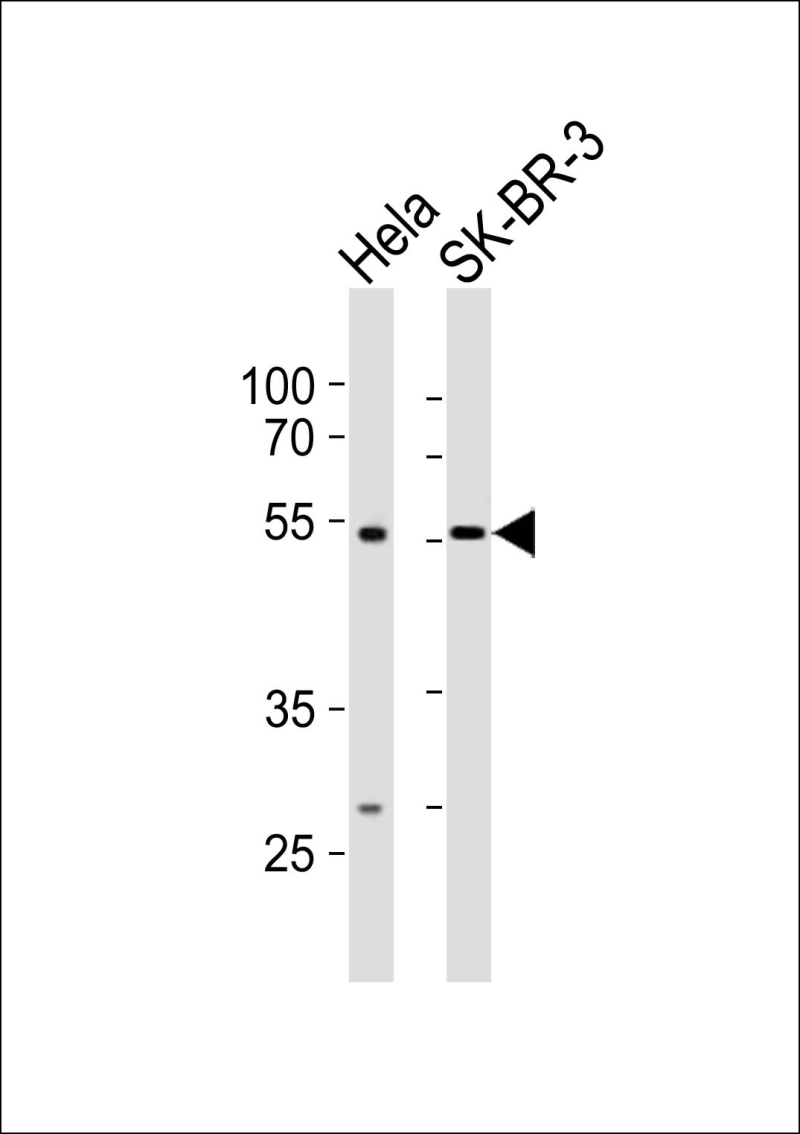
| WB | 1/1000 | Human,Mouse,Rat |
| IF | 咨询技术 | Human,Mouse,Rat |
| IHC | 咨询技术 | Human,Mouse,Rat |
| ICC | 技术咨询 | Human,Mouse,Rat |
| FCM | 咨询技术 | Human,Mouse,Rat |
| Elisa | 咨询技术 | Human,Mouse,Rat |
| Aliases | SWI/SNF-related matrix-associated actin-dependent regulator of chromatin subfamily E member 1, BRG1-associated factor 57, BAF57, SMARCE1, BAF57 |
| Entrez GeneID | 6605 |
| WB Predicted band size | 46.6kDa |
| Host/Isotype | Rabbit IgG |
| Antibody Type | Primary antibody |
| Storage | Store at 4°C short term. Aliquot and store at -20°C long term. Avoid freeze/thaw cycles. |
| Species Reactivity | Human, Mouse, Rat |
| Immunogen | This SMARCE1 antibody is generated from a rabbit immunized with a KLH conjugated synthetic peptide between 327-361 amino acids from the C-terminal region of human SMARCE1. |
+ +
以下是关于SMARCE1抗体的3篇参考文献及其摘要概括:
---
1. **文献名称**:*SMARCE1 deficiency generates a distinct epigenetic subtype of meningioma*
**作者**:Shibahara, I., et al.
**摘要内容**:本研究利用SMARCE1抗体进行免疫组化分析,发现SMARCE1表达缺失与脑膜瘤的特定表观遗传亚型相关。研究揭示了SMARCE1在维持染色质稳定性中的作用,其缺失可能导致肿瘤抑制功能丧失,为脑膜瘤的分子分型提供了依据。
---
2. **文献名称**:*Loss of SMARCE1 promotes clear cell carcinoma progression through aberrant SWI/SNF complex assembly*
**作者**:Wang, X., et al.
**摘要内容**:通过Western blot和免疫荧光实验(使用SMARCE1抗体),作者发现SMARCE1在透明细胞癌中频繁缺失,导致SWI/SNF复合体异常组装,促进肿瘤侵袭性。研究强调了SMARCE1作为潜在治疗靶点的价值。
---
3. **文献名称**:*Epigenetic regulation by SMARCE1 in ovarian cancer: Insights from antibody-based profiling*
**作者**:Gonzalez, M.E., et al.
**摘要内容**:该研究通过SMARCE1抗体进行染色质免疫沉淀(ChIP),证明SMARCE1通过调控特定基因的染色质可及性抑制卵巢癌转移。SMARCE1低表达与患者预后不良显著相关,提示其作为生物标志物的潜力。
---
这些文献均通过SMARCE1抗体探讨了该蛋白在肿瘤发生、表观遗传调控及临床诊断中的作用。
The SMARCE1 antibody is a crucial tool for studying the SMARCE1 protein, encoded by the *SMARCE1* gene (SWI/SNF-related, matrix-associated, actin-dependent regulator of chromatin, subfamily E, member 1). SMARCE1 is a subunit of the SWI/SNF chromatin-remodeling complex, which regulates gene expression by altering chromatin structure. This complex plays roles in DNA repair, differentiation, and tumor suppression. SMARCE1 specifically contributes to the stabilization and targeting of the SWI/SNF complex to chromatin. Antibodies against SMARCE1 are widely used in research to investigate its expression, localization, and interactions in normal and diseased tissues.
SMARCE1 dysfunction is linked to cancer and genetic disorders. Mutations or deletions in *SMARCE1* are associated with clear cell meningiomas, renal and ovarian clear cell carcinomas, and Coffin-Siris syndrome. SMARCE1 antibodies help detect protein loss or aberrant expression in these pathologies, aiding in diagnostic and mechanistic studies. Common applications include immunohistochemistry (IHC), Western blotting, and immunofluorescence. Researchers also use these antibodies to explore SMARCE1's role in chromatin remodeling, epigenetic regulation, and its interplay with other SWI/SNF subunits. Commercial SMARCE1 antibodies vary in clonality, species reactivity, and validation standards, necessitating careful selection based on experimental needs.
×